A Practical Guide to .NET Development
Organizations evaluating software platforms often run into confusion around .NET. Some treat it as a programming language, others assume it applies only to older Windows applications, which can complicate technology planning and hiring decisions.
.NET is Microsoft’s .NET development platform used to build enterprise software, APIs, cloud services, desktop applications, and mobile apps. It combines runtime infrastructure, developer tools, and libraries within the broader Microsoft ecosystem, making it a common choice for business-critical systems.
Introduction to the .NET Ecosystem.
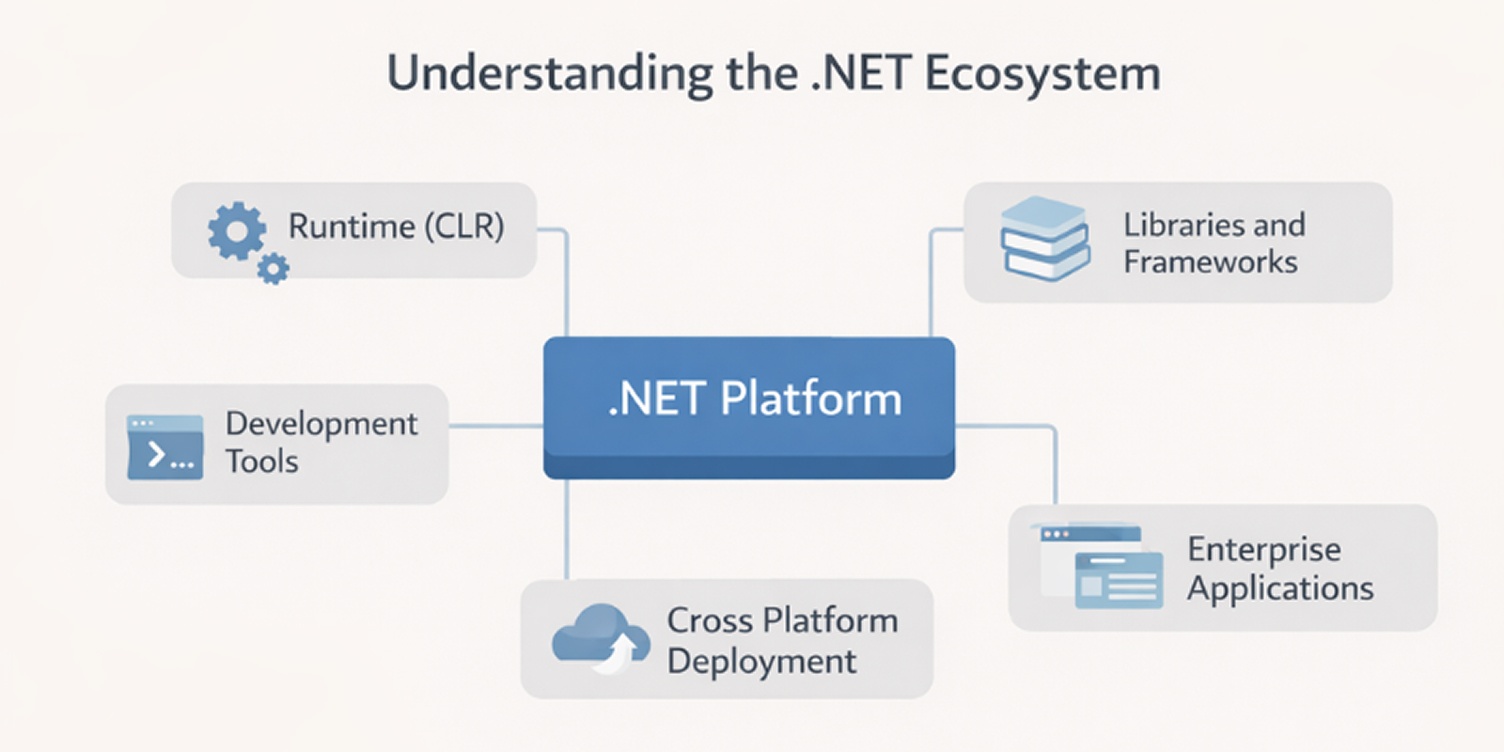
Understanding well the .NET ecosystem assists the organizations to avoid missteps that may cost them a lot in choosing a platform of development. Companies considering .NET in enterprise software or APIs, in the cloud or operational system, frequently require insight into the changing makeup of the ecosystem and the tools engaged in it, as well as how it can be applied in current deployment contexts.
Evolution of the .NET platform
The initial .NET Framework was developed specifically to support Windows-based enterprise software, and several existing applications in business are still relying on it. Due to this heritage availability, .NET is occasionally considered as only being limited to Windows-only systems.
Modern .NET, which evolved through .NET Core into a unified platform, now supports broader deployment flexibility across operating systems and cloud infrastructures. These changes influence hosting decisions, infrastructure planning, and long-term modernization strategies, with many organizations needing to choose between modern .NET and the traditional .NET Framework when planning migrations, upgrades, or future platform investments.
Because there are still several implementations of .NET in the enterprise settings, the ability to be clear about the roles of each allows the teams to make better choices regarding new builds, upgrades, and modernization efforts.
The distinctions become clearer when viewed side by side:
The primary language focus is C#
When you use the .NET framework, C# is the programming language of choice in the majority of the software projects. It is also one of the most widely utilized languages for developing backend services, APIs, enterprise-level applications, and enterprise software systems where performance and long-term maintainability are critical.
C# also has an established track record of a weak job market compared with other programming languages, with considerable documentation available to aid in providing assistance for onboarding employees when companies expand staffing or transfer projects to different technology providers.
ASP.NET for web and API development
ASP.NET is the .NET framework for building web applications and backend APIs. Many organizations still assess how ASP.NET fits into modern web platforms when they plan scalable enterprise systems and digital services.
API-driven architecture is essential for many current platforms. This includes enterprise management systems, SaaS solutions, and delivery-based applications.
ASP.NET is often used for:
- Dashboards and mobile apps that use backend APIs
- Administrative portals for operations teams
- Customer-facing web platforms
These applications typically need structured data handling, authentication processes, and integration with logistics, payment systems, or other operational services.
Cross-platform capabilities
Windows, Linux, and cloud hosting environments are all compatible with modern .NET applications. Organizations are able to avoid being restricted to a single infrastructure approach thanks to this flexibility.
Cross-platform deployment reduces costs, increases infrastructure adaptability, and supports cloud migration strategies for businesses preparing long-term software investments.
Development tooling overview
Integrated development environments such as Visual Studio, command-line tools for automated builds, and SDK packages that aid in dependency management and deployment workflows are all part of the .NET ecosystem.
These tools are designed to standardize development and deployment procedures across various environments, according to Microsoft's official .NET documentation. For companies, this frequently translates into easier long-term maintenance and more predictable development cycles.
Core components of the .NET ecosystem
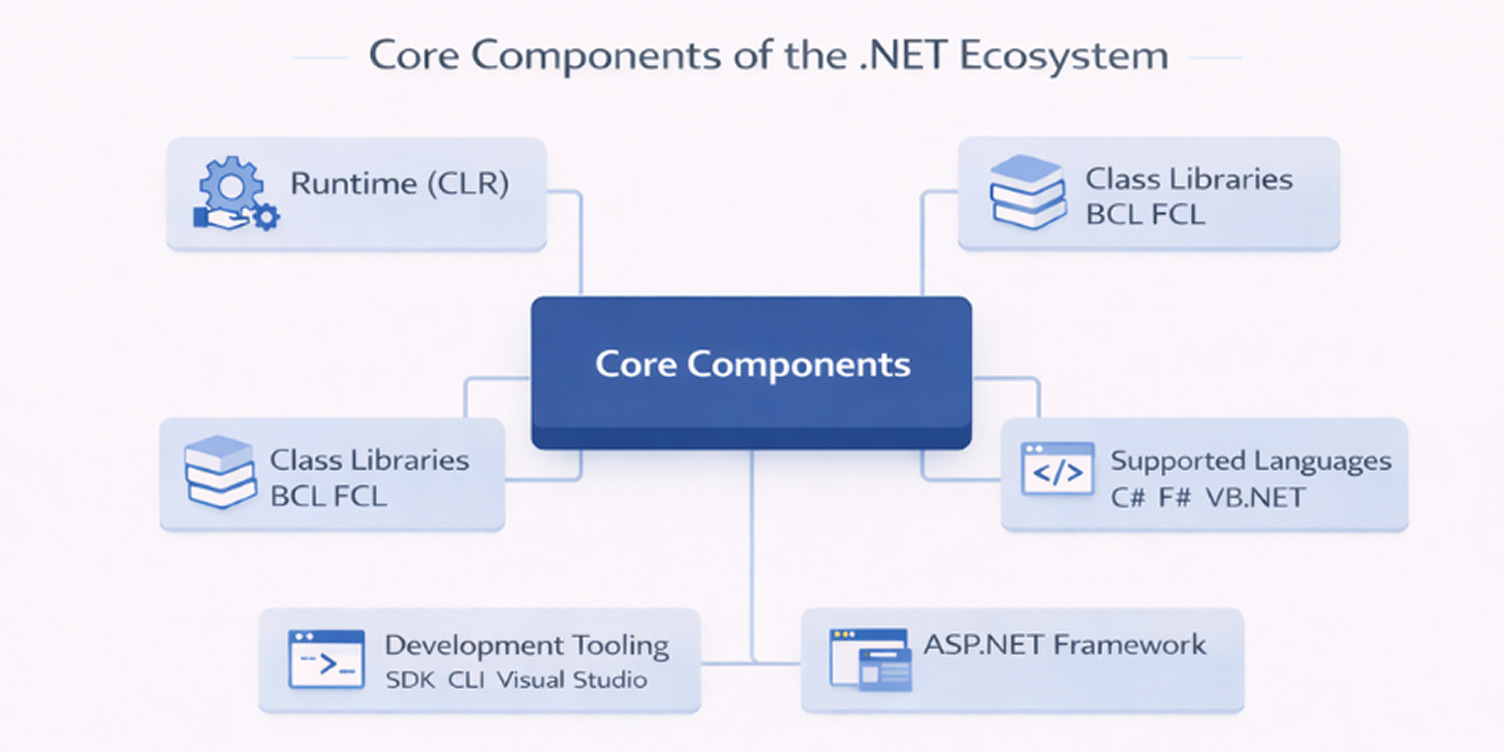
Grasping how .NET functions allows us a better picture of what it does for software development. The confusion that often surrounds it for businesses looking to evaluate a .NET system can be minimized through an understanding of the components of .NET and their function; this is especially true when making architectural, personnel, and sustaining decisions.
CLR Runtime and Execution Environment
The Common Language Runtime (CLR) is where .NET applications run. It manages memory allocation, enforces security, handles exceptions, and oversees code execution. This layer standardizes how applications operate across different environments and decreases the amount of low-level system work developers need to handle directly.
For operational platforms like delivery systems, SaaS tools, or enterprise dashboards, stable execution environments help reduce unexpected runtime issues. This stability usually leads to easier monitoring, better maintenance planning, and smoother system updates.
Class Libraries Including BCL and FCL
Prebuilt functionality for common development requirements like networking, data processing, file operations, and security handling is offered by the Base Class Library and Framework Class Library.
Instead of rebuilding fundamental software components, these libraries enable teams to concentrate more on business logic.
These libraries typically support the following business functions:
Session management and authentication
Workflows for database connectivity and validation
Integration with analytics tools, messaging platforms, or payment gateways
Well-known libraries frequently have copious documentation, which makes troubleshooting and ongoing maintenance easier.
Supported Programming Languages
.NET has a variety of programming languages, with C# being the primary programming language for commercial applications. F# may be used for analytics projects, while VB.NET primarily exists as a legacy in enterprise systems.
From a business perspective, the maturity of a programming language increases the likelihood of being able to hire staff trained in that language, will help reduce the time it takes to onboard new employees, and provide more flexible options when selecting vendors.
Consistent language ecosystems generally create less operational friction for teams expanding their use of those languages across multiple projects and when moving from one development partner to another.
ASP.NET Ecosystem for Web and API Development
ASP.NET is the framework used to build web platforms, backend APIs, and administrative systems within the .NET ecosystem. Many enterprise platforms, delivery applications, and SaaS products depend on ASP.NET for organized API communication and backend tasks.
These frameworks usually support authentication workflows, data processing, and integration with systems like payment services, logistics platforms, and reporting tools, which is why many organizations prioritize API development solutions that align with existing backend infrastructure. A reliable API infrastructure often becomes crucial as platforms expand and integrations grow.
Entity Framework for Data Access
By enabling developers to work with data using object-oriented models rather than complex raw database queries, Entity Framework streamlines database interaction. This method frequently makes data-access code easier to read and maintain.
Structured data access frameworks lower development costs and make future system updates easier for companies handling operational data like orders, inventory, customer accounts, or analytics reporting.
NuGet Package Manager and Dependency Handling
NuGet is the official package manager for .NET development. It helps teams manage third-party libraries, maintain dependency versions, and integrate external functionality more efficiently.
Common integration scenarios include:
Payment processing services
Notification and communication platforms
Analytics or reporting integrations
External API connectivity
Clear dependency management often reduces integration risks and supports smoother maintenance cycles.
SDKs, CLI Tools, and Development Tooling Basics
.NET development usually involves software development kits, command-line tools, and integrated environments like Visual Studio. These tools help with building, testing, packaging, and deploying applications in various settings.
Standardized tool environments typically make it easier for distributed teams to collaborate. For organizations working on long-term digital products, reliable development workflows can reduce disruptions during updates, maintenance, or team changes.
How does .NET architecture actually work?
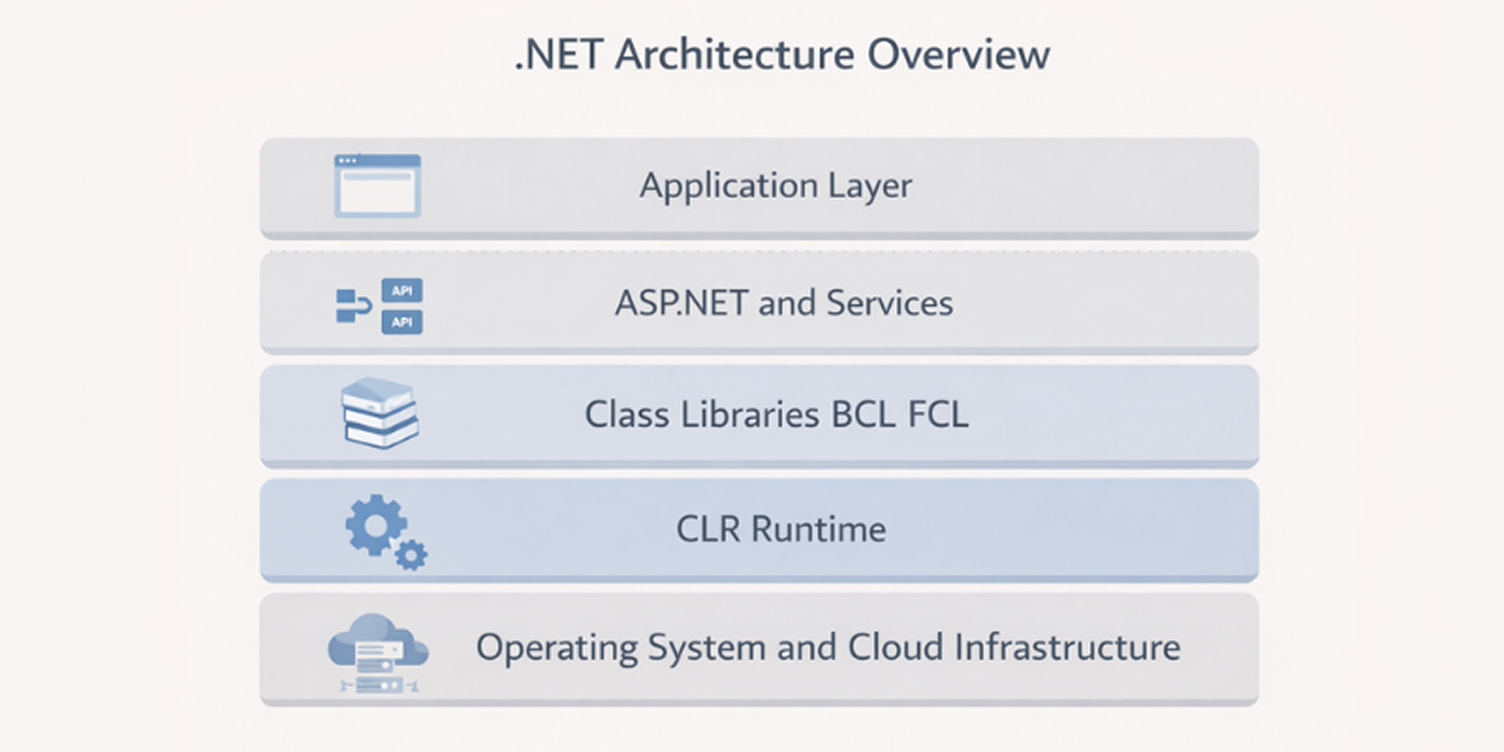
Understanding how .NET architecture is structured helps clarify how applications are built, maintained, and expanded over time. For businesses looking into .NET development, this context sets expectations around system stability, integration effort, and long-term planning.
CLR (Execution Engine Overview)
The Common Language Runtime (CLR) is the execution layer where .NET applications run. It manages memory allocation, security checks, and error handling. This allows developers to concentrate on application functionality instead of system-level tasks.
This centralized execution model helps keep consistency across services. When multiple components work within the same runtime environment, debugging and system updates become more predictable.
Class Libraries (BCL and FCL Purpose)
The Base Class Library and Framework Class Library provide ready-to-use components for common programming needs like data handling, networking, file operations, and security.
This saves time by reducing the need to build foundational functionality from scratch. It allows development teams to focus more on business logic rather than repetitive low-level coding.
These libraries often support essential application functions such as
User authentication and session handling
Database access and data validation
External service integrations, including payments or notifications
Because these components are widely adopted and well documented, troubleshooting and maintenance generally become more manageable over time.
Runtimes vs SDKs Distinction
The runtime allows apps to function on a system, while the Software Development Kit (SDK) provides all the tools needed to build, test, and package those apps. Understanding this distinction can change how applications are deployed and set up within an organization's infrastructure.
For example, production environments usually use only the run time, while development environments use SDK tools. Keeping production/development environments separate can help make it easier to manage infrastructure and avoid excess load to the system.
Developer Tools and Build Workflow
.NET development typically uses integrated environments like Visual Studio, command-line build tools, and testing frameworks that help standardize development workflows. These tools affect how efficiently teams release updates, test new features, and keep applications stable.
Consistent tools often lead to easier collaboration among development teams, better testing practices, and more predictable release cycles as applications grow.
Layered Architecture Concepts
Many .NET applications follow layered design structures where presentation interfaces, business logic, and data access components are separated. This structure helps teams update specific parts of an application without affecting unrelated areas.
For business platforms, this often reduces maintenance risk when introducing new features or modifying existing functionality, especially as systems grow more complex.
Microservices and Distributed System Support
.NET supports microservices architecture. In this model, applications consist of independent services that communicate through APIs. This approach is often preferred when platforms need to manage various operational areas that develop separately.
Typical service divisions may include:
Order management and transaction processing
Payment handling and billing workflows
Delivery tracking and logistics coordination
This structure can improve system stability during updates, though it requires thoughtful monitoring, communication between services, and operational planning.
Cloud Deployment Patterns
Cloud-based infrastructures (like Microsoft’s Azure) host much of the world’s .NET applications today, as they enable users to scale up and down based on their actual usage versus being permanently allocated a certain amount of hardware resources.
For those applications that see high variability (high/low) in usage over time, deploying to the cloud can help to ensure continued service delivery while allowing your organization to manage its infrastructure in a flexible manner.
Types of applications built with .NET
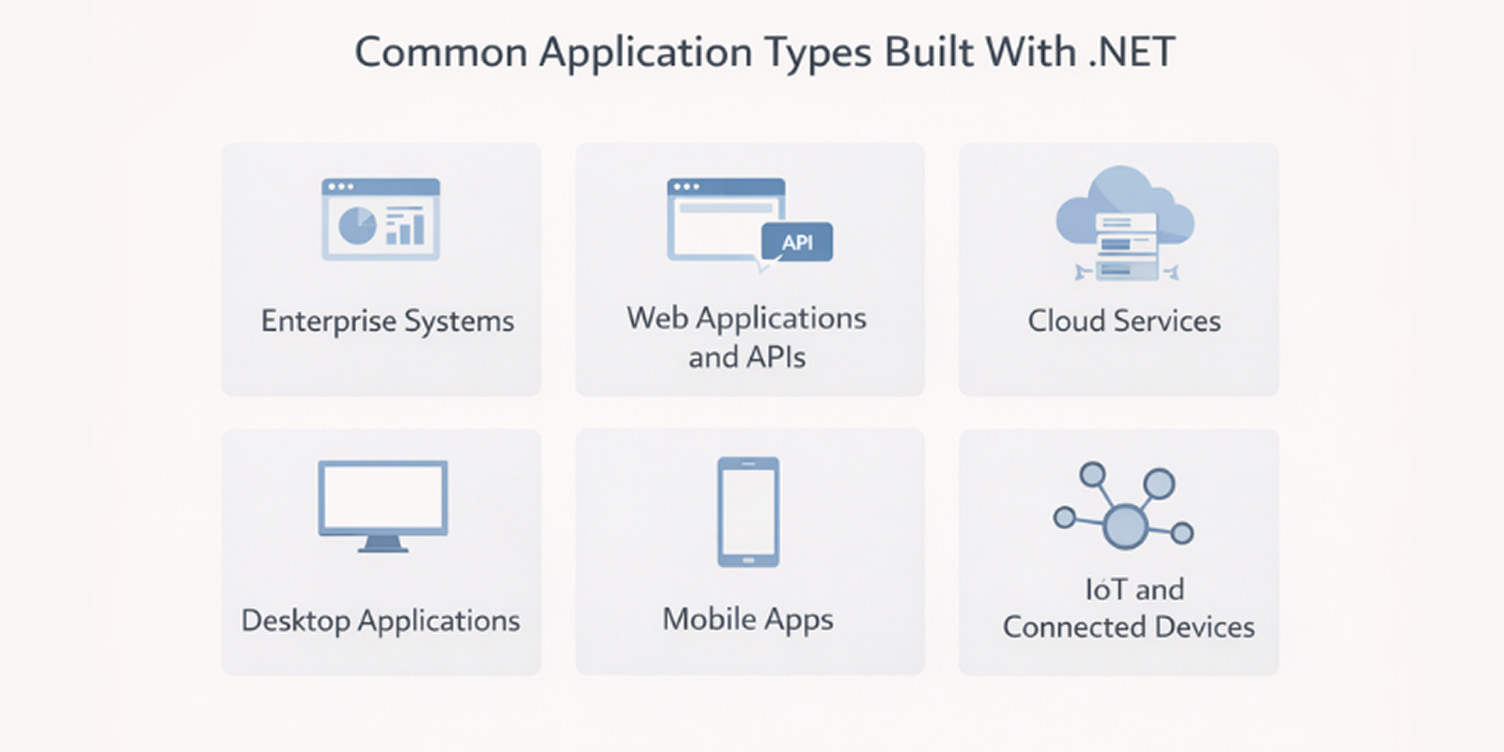
Understanding where .NET development shows up in real products helps businesses decide whether it fits their own technology roadmap.
The platform extends beyond traditional web apps into enterprise systems, cloud services, mobile applications, and connected infrastructure areas that often overlap in operational platforms like logistics or delivery marketplaces.
Enterprise Software Development
.NET is widely used for internal business systems that manage reporting, workflows, and operational data. These applications usually require reliable database integration, authentication controls, and compatibility with existing corporate infrastructure.
You’ll often see similar architecture patterns in enterprise platforms such as Microsoft Dynamics, where operational dashboards, transaction systems, and business analytics tools run on long-term supported technology stacks.
Organizations tend to favor platforms with predictable update cycles since these systems often remain in production for years, which is why enterprise app development services are frequently considered during long-term platform planning.
Web Application and API Development
Web applications and backend APIs remain one of the most common uses of .NET development. API-driven architecture becomes especially important when mobile apps, partner integrations, and administrative dashboards all connect to a shared backend.
Community platforms like Stack Overflow historically used .NET infrastructure for large-scale web operations. Similar backend structures are common in delivery or marketplace products where ordering workflows, payment processing, and logistics coordination depend heavily on stable APIs.
Cloud-Based Services and Distributed Systems
.NET applications frequently operate on cloud infrastructure and are often structured as distributed services. Components such as authentication, payments, analytics, or notifications can function independently while sharing centralized data.
Many enterprise SaaS products run .NET workloads on Microsoft Azure because the ecosystem is designed to support cloud-hosted business applications, often requiring experienced SaaS development specialists familiar with cloud-native architectures as these platforms scale. This setup helps organizations manage infrastructure demand as usage patterns change.
Desktop Application Development
Desktop software still plays a role in operational environments despite growth in browser-based tools. Administrative panels, reporting systems, and specialized internal tools often continue to run locally.
Development environments like Visual Studio itself are built using .NET technologies, reflecting how deeply the platform integrates with desktop workflows. Offline functionality and operating system integration remain common reasons organizations maintain desktop applications.
Mobile Application Development with .NET
.NET supports cross-platform mobile development through frameworks such as .NET MAUI and the earlier Xamarin ecosystem. These tools allow teams to build Android and iOS apps while maintaining shared backend logic and integrations.
Microsoft documents this approach through projects such as .NET MAUI, where mobile apps connect directly with backend APIs, authentication systems, and operational dashboards. Businesses often consider this when consistency between mobile and backend systems is important.
Game Development and Interactive Platforms
Game development is another area connected to the .NET ecosystem through C#. The widely used Unity engine relies on C#, which demonstrates how the platform extends beyond enterprise software.
The same underlying technology sometimes supports simulation tools, training platforms, or interactive visualization software where graphical interfaces and performance requirements matter.
Internet of Things and Connected Device Applications
.NET is also used in Internet of Things environments where connected devices communicate with centralized applications. This includes logistics tracking hardware, kiosks, industrial sensors, and operational monitoring systems.
Platforms built on ecosystems such as Azure IoT often integrate .NET backend services to manage device communication, analytics, and reporting. For businesses handling distributed physical assets, this integration can become operationally significant.
Technologies frequently used with .NET
Selecting a development platform is not a simple choice. In addition to the platform, other factors are involved. When companies assess .NET development, they require information on how .NET development integrates with other technologies such as frontend tools, cloud platforms, databases, and deployment processes.
Frontend frameworks
Frontend development is done using JavaScript libraries like Angular or React, while backend development is handled with .NET. This separation helps maintain a structured UI with clearly defined APIs, with many teams also considering the benefits of using React.js when selecting technologies for modern applications.
Deployments such as SaaS platforms or enterprise dashboards often follow this approach to keep frontend and backend responsibilities clearly separated.
Blazor, Microsoft’s .NET-based frontend framework, offers another option by allowing interfaces to be built using C#, although many teams still prefer JavaScript frameworks because of their larger ecosystems and community support.
Cloud platform compatibility
.NET applications are supported on all major cloud platforms, including Azure, AWS, and Google Cloud. Companies that use Microsoft enterprise software often prefer Azure for its infrastructure and identity integration. However, many also choose multi-cloud platforms for their flexibility and cost savings.
For applications with fluctuating demand, cloud compatibility is important for deployment strategies, availability, and resource allocation. Aligning application architecture with the hosting strategy from the start can help prevent migration problems later on.
Database ecosystem and data access tools
.NET supports various database systems based on business requirements. SQL Server is preferred in Microsoft-centric ecosystems, and PostgreSQL is preferred for open-source adaptability and cloud compatibility. ORM tools like Entity Framework assist in database interaction through organized models.
For applications handling orders, customer information, reporting dashboards, or analytics pipelines, database compatibility is a direct factor in maintenance, performance, and scalability planning down the line.
DevOps, containerization, and deployment tooling
Contemporary .NET application development uses containerization tools like Docker and CI/CD pipelines for automated testing and deployment, often after teams evaluate the benefits of containerized deployment workflows. These methods provide consistent environments for development, testing, and production.
Companies developing operational platforms might use automated deployment processes to reduce deployment risks and ensure service continuity. Well-structured DevOps processes often simplify maintenance as products mature and updates become more frequent.
Technical aspects that affect the adoption of .NET
The choice of a development platform has implications that go beyond the time it takes to build. It affects the stability of the system, security risks, infrastructure flexibility, and the ease of evolving the product later on.
In the case of businesses that are developing platforms like delivery apps, marketplaces, and operational dashboards, these technical aspects are some of the most important considerations during the adoption process.
Performance considerations
The performance of the backend is most important in applications that involve frequent transactions, user requests, and interactions with external systems. The current trend in .NET development emphasizes efficient memory management, optimized runtime performance, and stable API performance.
In the case of operational platforms such as delivery apps, the performance of the backend is more important than peak performance metrics. Order processing delays, payment retries, and API performance issues are often more related to architecture than technology.
Security and compliance readiness
The expectations of security are increasing, especially in platforms that handle payments, personal information, and operational analytics. .NET provides well-established authentication libraries, encryption support, and access controls that are consistent with enterprise security patterns.
In regulated industries, organizations tend to prefer technologies that have well-documented security configurations. This predictability makes compliance easier and reduces the time it takes to launch products.
Cross-platform deployment flexibility
.NET applications are now capable of running on Windows, Linux, and leading cloud platforms. This flexibility allows organizations to avoid depending on a single infrastructure configuration and adopt cloud platforms as business requirements evolve.
In companies that are developing customer-facing applications together with internal operational applications, cross-platform flexibility often leads to easier deployment planning and fewer surprises during the scaling and migration process.
Ecosystem maturity and documentation support
A key benefit of .NET development is the maturity of the .NET ecosystem. The .NET ecosystem has been around for a long time and has been widely adopted in the enterprise world. This has led to the development of a rich set of documentation and a large community of developers.
This is often reflected in real-world operations:
Simplified onboarding when hiring more developers
More predictable debugging because of well-established best practices
Greater access to senior developers
In companies that are developing long-term digital products, ecosystem maturity is often as important as capability.
Advantages of choosing .NET
When organizations assess a technology platform, the conversation typically progresses from features to business implications. Long-term support, infrastructure compatibility, personnel flexibility, and maintenance predictability are some of the considerations that influence platform choices.
Knowing the role of .NET within these business factors can help alleviate concerns prior to committing to a technology platform.
Vendor support and platform maturity
.NET is a Microsoft product, and Microsoft provides continuous updates and support options for businesses. This level of backing gives organizations more confidence when adopting technology that will likely remain in use for many years.
Organizations using systems like logistics platforms, transaction services, or internal dashboards often focus on platform maturity. A well-supported ecosystem lowers the chances of unexpected compatibility problems or sudden technology changes.
Long-term support and predictable lifecycles
Microsoft sets clear support timelines for .NET releases, including long-term support (LTS) versions meant for extended use. This structured approach helps organizations plan upgrades in a more manageable way.
When release cycles are clearly outlined, budgeting becomes simpler, downtime risks go down, and technical updates can be better coordinated with business planning.
Development process predictability
The .NET ecosystem has consistent tooling standards, structured frameworks, and well-documented engineering practices. This results in clear project timelines and improved communication/collaboration amongst development teams.
On a larger scale, organizations that align their technology initiatives with broader business objectives (product launches, integrations, and operational expansions) like to have predictable workflows to minimize uncertainty and provide predictable delivery.
Integration with microsoft infrastructure
Numerous companies operate in Microsoft environments (Azure cloud, Microsoft 365, and Windows-based enterprise systems); therefore, .NET integrates seamlessly into these environments. As a result, identity management, data integration, and coordinating infrastructure can be simplified.
This integration also leads to fewer complexity challenges when connecting operational platforms, analytics platforms, and customer-exposed digital services.
Maintenance stability and talent availability
The .NET ecosystem has been present in enterprise environments for many years. With abundant documentation, mature debugging tools, and a large pool of potential developers, the .NET ecosystem's maintenance processes are more stable and manageable than other systems.
For companies implementing long-term technology investments, maintenance stability is equally important regarding total cost of ownership as it is with respect to creation costs. A maintained ecosystem generally reduces overall time spent troubleshooting, recruiting for positions, and performing future upgrades to the business.
Key considerations before adopting .NET
A development platform can shape an organization’s direction well beyond the initial build. Companies planning to use .NET for delivery platforms, SaaS products, or internal systems usually start by looking at a few practical factors.
These include how prepared their team is, whether their current infrastructure supports the technology, and what the overall investment will look like.
They also consider whether the platform genuinely fits the project’s long-term goals. Taking the time to evaluate these areas early can help prevent costly changes, delays, and operational challenges later on.
Learning curve and team readiness
.NET uses established frameworks, tools, and architectural patterns. For teams coming from different technology backgrounds, adjusting to these standards may take time. Even with good documentation, a learning period involving training and aligning internal processes is still necessary.
Teams working on customer-facing platforms sometimes underestimate this adjustment period. Hiring experienced developers or planning structured onboarding can help minimize delays during the early stages of development.
Infrastructure alignment
Organizations already using Microsoft technologies like Azure or Windows-based systems often find it easier to integrate with .NET. Teams rooted in other ecosystems may need to plan carefully around hosting, identity management, and data integration.
Infrastructure alignment impacts long-term operational efficiency. Checking compatibility at the start can prevent future migrations that incur additional costs or downtime.
Cost of .NET implementation
When using .NET, there is much more than just the cost of developing the software. In addition to developing the application, you will also have to pay for the infrastructure to host your application and hire and maintain employees who will be responsible for maintaining the application, as well as consume cloud resources on behalf of your organization.
Infrastructure that supports applications that experience spikes in traffic (e.g., delivery apps during peak periods of time or promotions) must be designed with the capability of scaling up or down as necessary. Without proper planning for capacity and architecture early in the process, you will increase the likelihood that your ongoing operational costs will be less predictable.
Alignment of the project scope with .NET
Many organizations will find that .NET is a very good fit for developing long-term, structured systems where reliability, integration reliability, and maintaining the application will be key concerns when the system is in production.
If your project is an experiment or prototype, then it may make more sense to use a lighter-weight framework that allows you to more quickly set up the application.
Selecting a technology that aligns with the project scope will help you reduce unnecessary complexity and allow you to increase your ability to scale should the product continue to grow.
How does .NET compare with other backend platforms?
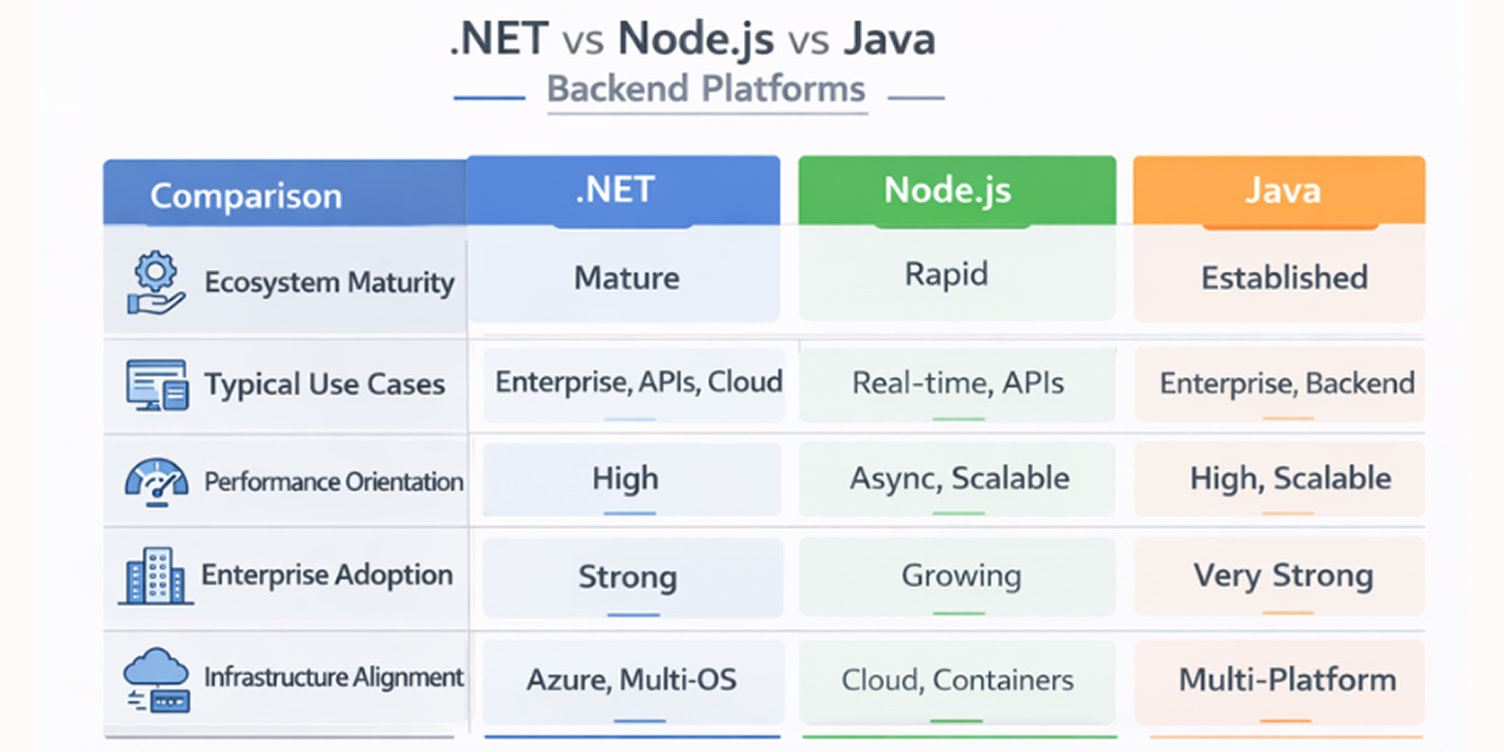
When choosing a backend development platform, most people use practical fit as opposed to brand recognition.
Companies that are investigating using .NET Development as an alternative to using Node.js or Java will often ask for clarification on the operational reliability of each and their respective implications on hiring, infrastructure compatibility, and long-term maintenance based upon which one they ultimately choose.
The purpose of the balanced comparison is to avoid making decisions based solely on trends or assumptions, since broader backend framework comparisons often help teams put these trade-offs into clearer perspective.
.NET vs Node.js for backend workloads
Node.js is popular among teams that use JavaScript a lot or those creating early-stage products where quick changes are important. It is a good fit for lightweight APIs, frontend-driven apps, and fast experimentation.
.NET development is commonly selected for organized backend environments where consistency, system integration, and ease of maintenance are important. Platforms that manage payments, ordering processes, or logistics often need that stability as usage increases.
.NET vs Java in enterprise contexts
Java and .NET meet similar needs in enterprises. Both provide well-developed frameworks, thorough documentation, and robust support systems. Many financial platforms, logistics systems, and enterprise SaaS products depend on one of these technologies.
The choice often hinges on the current infrastructure and the team's experience. Organizations already using Microsoft cloud or tools may favor .NET. In contrast, companies experienced with Java typically stick with that stack for consistency.
When other platforms may be a better fit
No single backend platform fits every project. Context, team expertise, and operational priorities usually determine the best choice.
Situations where alternatives may make sense include:
Early prototypes where experimentation speed outweighs long-term structure
Teams deeply invested in JavaScript choosing Node.js for stack consistency
Organizations with established Java infrastructure maintaining operational alignment
When assessing backend technology against business requirements, infrastructure context, and team capabilities, you generally will arrive at a much better platform solution for the long term.
When is .NET the right choice?
Choosing a development platform becomes clearer when evaluated against operational realities rather than feature lists. Businesses considering .NET development usually want to understand whether it fits their product complexity, security expectations, infrastructure compatibility, and long-term maintenance plans.
For delivery platforms or similar service ecosystems, the right choice often depends on how the platform is expected to operate and evolve over time.
Projects with complex operational workflows
.NET often fits well when a platform must coordinate several operational processes reliably. Delivery-style products commonly combine ordering systems, payment handling, partner onboarding, analytics, and logistics coordination. These interconnected workflows typically benefit from structured backend architecture and predictable development practices.
Organizations moving beyond prototype-stage products often find stability and maintainability more valuable than rapid experimentation. In those cases, .NET development tends to align well with operational requirements.
Environments with strong security or compliance expectations
Applications handling payments, personal data, or operational analytics usually require clearly defined authentication, encryption, and access control mechanisms. .NET includes established security frameworks and configuration standards that support enterprise governance requirements.
For businesses operating in regulated sectors or managing sensitive operational data, having well-documented security practices can simplify audits and reduce long-term risk exposure.
Organizations already using microsoft infrastructure
Companies working within Microsoft environments often experience fewer integration challenges with .NET. Alignment across cloud services, identity systems, and enterprise tooling can simplify deployment planning and operational coordination.
This alignment becomes particularly useful when:
Azure cloud services are already part of infrastructure planning
Internal systems depend on Microsoft identity or data services
Customer-facing platforms must connect with internal reporting tools
Infrastructure compatibility often influences operational efficiency over time.
Products designed for long-term operation
Some platforms are built for experimentation, while others are expected to operate continuously with gradual feature expansion. .NET development is often selected for long-term products because of its mature ecosystem, extensive documentation, and consistent vendor support.
For delivery platforms or SaaS products expected to evolve alongside business growth, maintainability usually carries as much weight as initial development speed.
Conclusion
Choosing a development platform is rarely about following trends. More often, it is about finding a long-term fit. Knowing where .NET works well helps businesses determine if it matches their operational complexity, security needs, infrastructure setup, and future product direction.
The decision to use a particular development framework doesn't usually come down to what's trendy but typically focuses on achieving a long-term best fit. Understanding what types of applications work best on the .NET Framework allows companies to find a good match for their complexity of operations, need for security, current infrastructure, and long-term plans for products.
Before making a final decision, it's useful to look at real-world architecture examples, industry use cases, and implementation approaches. Taking this broader view helps in selecting a platform that meets immediate project goals and supports long-term stability and growth.
